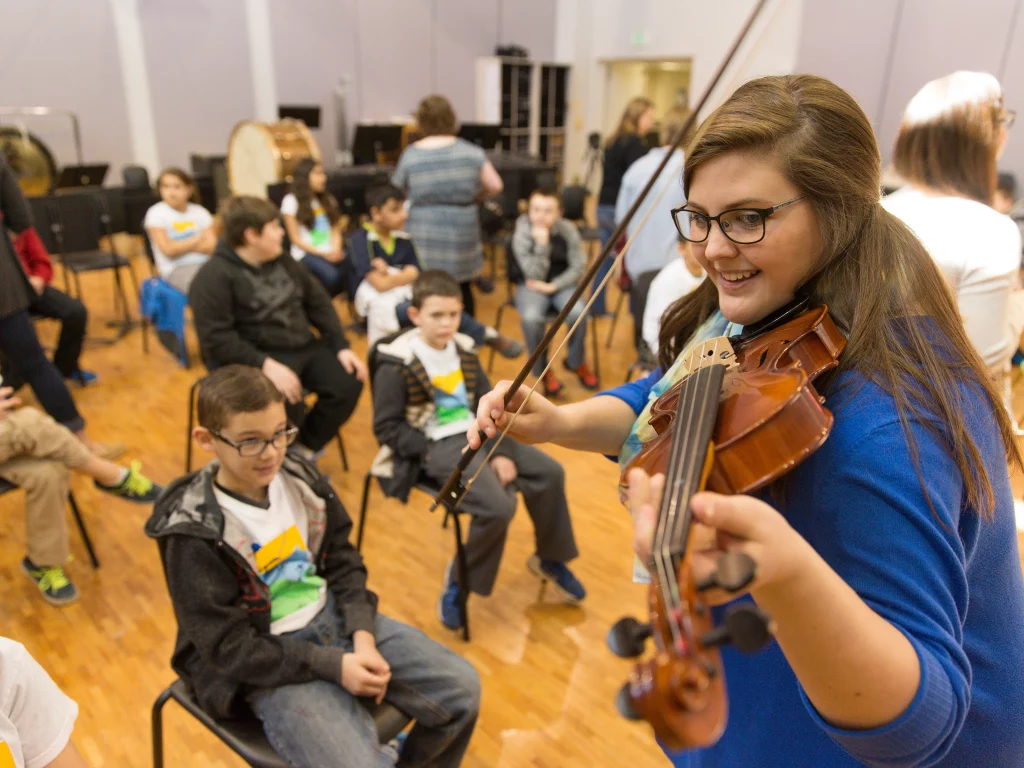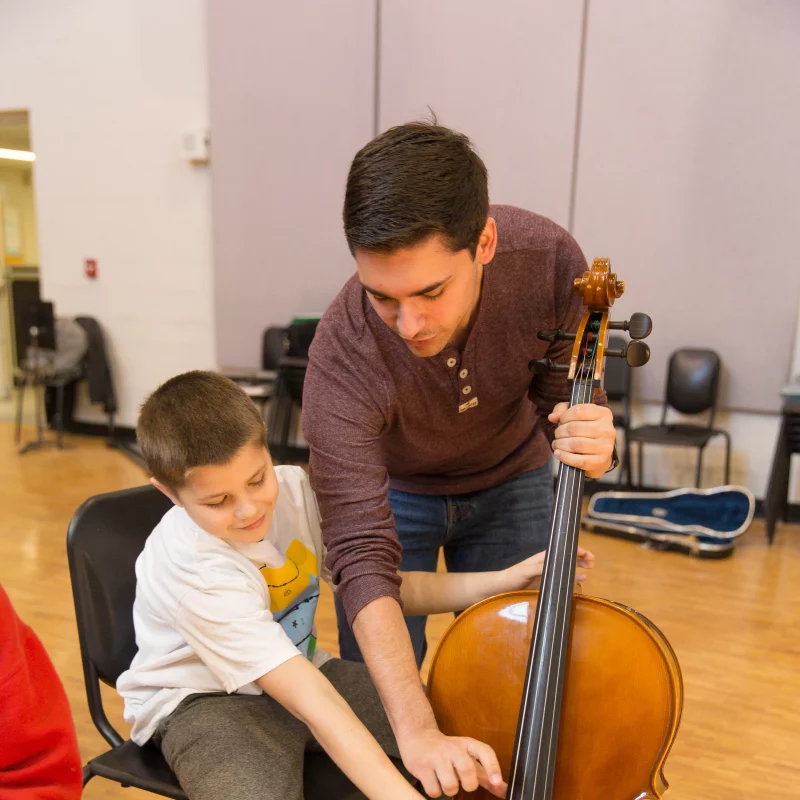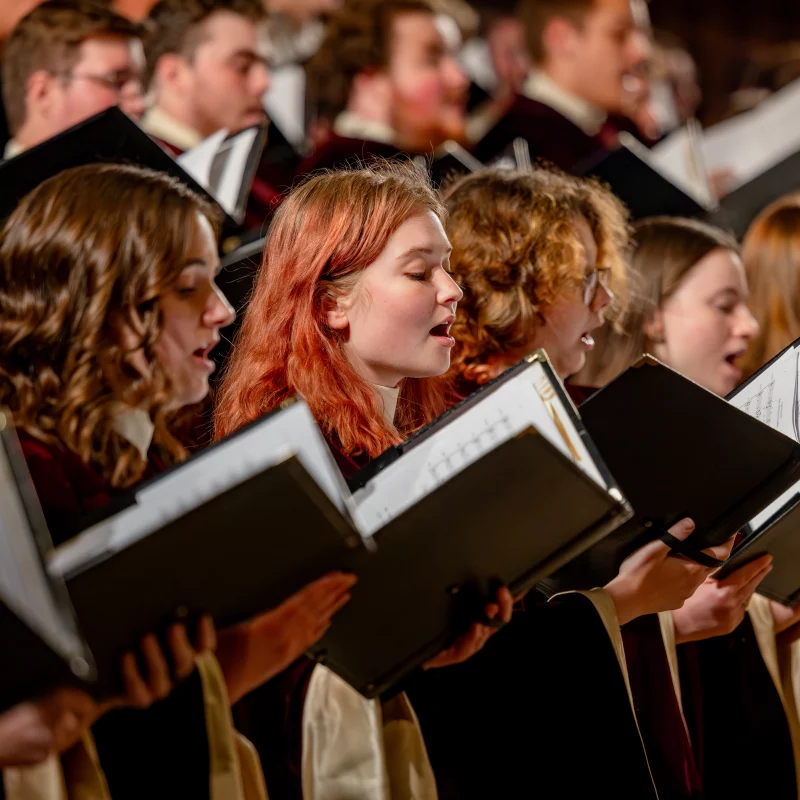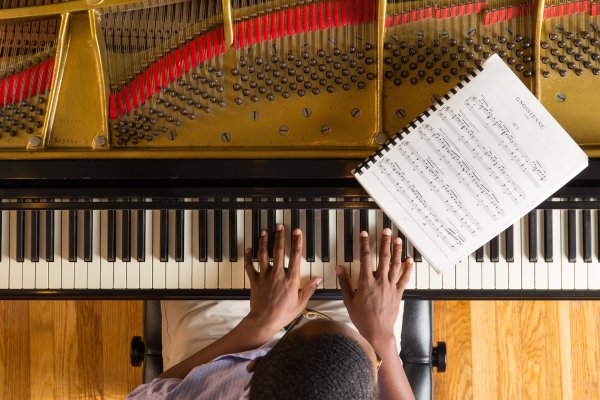Music Education

Why Music Education at Valpo?
Grounded in learning, we radiate inspiration. Valpo’s bachelor of music education empowers the professional educators of tomorrow. Our institution – accredited by the National Association of Schools of Music – fosters essential skills for every student in the program through a wide range of teaching opportunities. Starting year one, our students engage in classroom observation and build the leadership skills needed for directing school music programs; by their senior year, they’re immersed in a robust student-teaching experience.
At Valpo, our four-year pathway is grounded in evidence-based practice and
hands-on teaching experience, all while nurturing the performer inside. By graduation, you’ll be prepared for licensure across all grade levels (P-12) in general, vocal, and instrumental music – and prepared to shine brightly among a vast network of alumni.
Music Education Highlights
P-12 Licensure
By the time our music education students don their caps and gowns, they’re prepared to meet Indiana state teacher requirements and education program requirements.
60+
performance opportunities are available throughout the academic year.
100%
of Valpo music education graduates are employed or enrolled in graduate school within nine months of graduation.
Music Education Major Requirements
Students pursuing a degree in music education must complete a supplemental music application and an on-campus or virtual audition with their primary instrument.
In tune with Valpo’s priorities, the Department of Music is dedicated to fostering the growth of impactful and compassionate music educators. Here, music education extends beyond practice, integrating service, faith, and creative expression. Our universal core – the Valparaiso University Experience (VUE) initiative – pairs well with in-depth study to strengthen communication, encourage critical thinking, and build cultural awareness.
This degree prepares students for certification as music educators through a comprehensive curriculum and real-world application. Out of a maximum of 136 credits, our program consists of a 39-credit music core and 26-credit music education core.
| Music Core: 31 Credits | ||
|---|---|---|
| MUS 109 | Musicianship I | 2 Cr. |
| MUS 110 | Musicianship II | 2 Cr. |
| MUS 209 | Musicianship III | 2 Cr. |
| MUS 210 | Musicianship IV | 2 Cr. |
| MUS 163 | Music Theory I | 3 Cr. |
| MUS 164 | Music Theory II | 3 Cr. |
| MUS 263 | Music Theory III | 3 Cr. |
| MUS 264 | Music Theory Iv: Post-Tonal | 3 Cr. |
| MUS 201 | Development of Western Music | 2 Cr. |
| MUS 213 | Basic Conducting | 2 Cr. |
| MUS 300 | Keyboard Proficiency | 0 Cr. |
| MUS 400 | Concert Attendance | 0 Cr. |
| MUS 499 | Music Colloquium | 0 Cr. |
| 6 Credits from the Following Options: | ||
| MUEN 350 | Choirs | 1 Cr. |
| MUEN 352 | Bands | 1 Cr. |
| MUEN 354 | Orchestra | 1 Cr. |
| 1 Credit from the Following Options: | ||
| MUEN 357 | Small Ensemble Music | 0.5 Cr. |
| MUEN 358 | Chamber Music | 0.5 Cr. |
| Music Education Core: 26 Credits | ||
| MUAP 375 | Performance Level Proficiency III | 0 Cr. |
| Secondary Instrument | ||
| MUS 230 | Wind/Percussion Methods | 3 Cr. |
| MUS 231 | Stringed Instructional Methods | 1 Cr. |
| MUS 239 | Voice Instructional Methods | 1 Cr. |
| MUS 312 | Scoring and Arranging | 2 Cr. |
| MUS 389 | School Music I | 3 Cr. |
| MUS 489 | School Music II | 3 Cr. |
| Additional Required Courses: 16 Credits | ||
| PSY 110 | General Psychology | 3 Cr. |
Music Education Career Outcomes
Our music education graduates shine as brilliant educators around the world. Our bright, musical Beacons have gone on to teach across more than 20 states and internationally after graduation.
Careers in Music Education:
- Music educator
- Music director
- Performer or composer
- Private music instructor
- University professor or administrator
Other music education graduates have continued to pursue advanced studies at reputable institutions like Boston University, Northwestern University, and the University of Notre Dame.

Student Success
– Joseph Sleweon ’26

